#aziraphale is both a bad angel and a really good one
Text
Small angst Good Omens headcannon/au:
Some humans have to report to angels for a bit if they are somehow part of the divine plan. Mostly the reports are oral as high literacy rates are recent and still a priviledge in some countries.
Aziraphale mostly is the one getting the reports but there are some special cases were a different angel does it. One of this times Aziraphel is sent to a human that used to report to Gabriel himself. Azi is really nervous but the report is actually going well and the human even shared a meal with him. Except the human decides to ask questions and they say "are the angels normally more like you or more like Gabriel? The two of you are just soo different" and what they were trying to say was "wow you're soo nice and I actually feel happy and calm talking to you are all the angels like that or is everyone else a condescending asshole?" but what Aziraphale heard was "wow you're a really shitty angel I hope the others aren't like you, Gabriel is soo cool" . When he said that most angles were like Gabriel trying to not sound hurt the human answered with an "oh" sound that meant "I was really hoping they would be more like you but hey at least we got you on earth" but what Aziraphale understood was "oh I was hoping it was that Gabriel was above the average but now I know they sent me a subpar angel". Aziraphale was sad the rest of the day. The human on the other hand was overjoyed they didn't had to report to Gabriel that year. It had been already a stressfull year without that.
#in my head the human is mary#for no other reason than I cannot imagine Gabriel talking to any other human#he despises humans too much#unless it had to be him by either god's or metatron orders he would have choose someone else to do it#that also means that Azi actually saw her again after the cruxifiction and they had a better talk#Azi ofc considered that this meant he got better as an angel in record time#Mary was just happy she didn't had to report the horrifying loss of her eldest child to Gabriel of all people#good omens#aziraphale#heaven is terrible#aziraphale is both a bad angel and a really good one#sorry no crowley this time
13 notes
·
View notes
Text
.
#I think the point that people overlook sometimes when talking about how azicrowley 'doesen't communicate' is that they actually do#they communicate PRETTY GREAT for the place they were their whole lifes#they communicate really good for two agents from different sides who shouldn't trust each other but still willing to try#for two beings that can be monitored constantly and dragged to literall hell torture or heavenly court for the crime of merely talking#they also isinely good at straing away from their sides propaganda#I wan't to point at Aziraphale specifically#like people can spend their whole lifes blinded by church propaganda#and we talk about someone who LITERALLY WAS GOD#WHO TALKED WITH GOD#WHO KNOWS THAT HEAVENS AND HELL AND GREAT PLAN — IT'S ALL REAL#can you IMAGINE what kind of intelligence curiosity openmindness and stubborness you need to even entertain the notion that your side may b#not right all the time??#and how brave and recless you need to be to step even a little outside of your side 'safety' when you SAW what happens to bad angels and yo#it's literally can be you! one wrong move and you're going to hell!! people heal from this thinking for YEARS in therapy and he's alone wit#LITERAL DEMON (who says that he doesen't have inside motives for this??) for company#and he know that the hell is a real place!!! he pass it every time he goes for office!! can you IMAGINE what it do for a mind#because I'm sure can't!#like he's actually coping INSINETLY good! all his nervous ticks and smiles and anxieties and double standarts and tendency#to lie and repress — it's all coping!! and it works!! since he still alive sane and friends with Crowley it WORKS#oh he's not (they both not) a paragon of mental health and proper communication? well#there's a possibility he's never would be#like you get it right? when your mentality so wrapped around survivng this one specific thing it stays with you! I'll be happy if they both#become more in peace and starts talking beforemaking assumptions but tbh they never will be 'normal' and that's okay!#because they makes it work! that's why their relationship so beautiful!!
1 note
·
View note
Text
I'm not really getting the Aziraphale hate because even without all the pressures of religious brainwashing etc etc we've literally just seen through his eyes:
- Crowley radiating joy at the sheer wonder of the universe only to be crushed by orders from up high
- Those orders being the ONLY reason Crowley fell. Aziraphale knows (and has always known) that Crowley fell simply because no one wanted to listen to his ideas.
- 6000 of Crowley clearly aching to do good in defiance of his own nature
- Crowley admitting how desperately lonely that defiance is for him
- Crowley being BETTER than Aziraphale at morality and making Aziraphale better as a result
- Evidence that no one is ever going to be chill with Angel/Demon relationships unless they are too powerful to be stopped and/or willing to vanish
- That they are never going to escape the monitoring of heaven/hell (they literally were *stalked* by both sides the entire season) so they can't just live unnoticed among humans
- Even during their last few years of 'freedom' Crowley has still been desperately unhappy. He's at the 'what's the point of it all???' stage BEFORE anything bad happens in S2. For all he talks about the preciousness of their life, Crowley is radiating misery during his freedom whereas Aziraphale actually seems happy.
Like why WOULDN'T Aziraphale see this offer as the perfect solution? Crowley can get what he always wanted - to do good without anyone stopping him, with Aziraphale helping. It can be exactly like the nebula scene forever - only this time Aziraphale can just bask in Crowley's joy.
From his pov he is sacrificing his own life on Earth for THAT.
Oof we are in the last 20% of a very angsty slow burn, kiddos.
#good omens#good omens spoilers#ineffable husbands#aziracrow#aziraphale#crowley#ineffable bureaucracy#gos2#good omens 2#good omens season 2
13K notes
·
View notes
Text
'...“It’s fun playing bad, but actually he’s not,” the actor says, smiling as he reflects on his character, Crowley. “He’s a villain with a heart. The amount of really evil things he does are vanishingly small.”
...As it always has, “Good Omens” dissects the view of good and evil as absolutes, showing viewers that they are not as separate as we were led to believe growing up. Aziraphale and Crowley’s long-standing union is proof of this. The show also urges people to look at what defines our own humanity. For Tennant — who opted to wear a T-shirt emblazoned with the words “Leave trans kids alone you absolute freaks” during a photocall for Season 2 — these themes are more important now than ever before.
“In this society that we’re currently living in, where polarization seems ever more present, fierce and difficult to navigate. Negotiation feels like a dirty word at times,” he says, earnestly. “This is a show about negotiation. Two extremes finding common ground and making their world a better place through it. Making life easier, kinder and better. If that’s the sort of super objective of the show, then I can’t think of anything more timely, relevant or apt for the rather fractious times we’re living in.”
“Good Omens” is back by popular demand for another season. How does it feel?
It’s lovely. Whenever you send something out into the world, you never quite know how it will land. Especially with this, because it was this beloved book that existed, and that creates an extra tension that you might break some dreams. But it really exploded. I guess we were helped by the fact that we had Neil Gaiman with us, so you couldn’t really quibble too much with the decisions that were being made. The reception was, and continues to be, overwhelming.
Now that you’re no longer bound by the original material that people did, perhaps, feel a sense of ownership over, does the new content for Season 2 come with a sense of freedom for you? This is uncharted territory, of sorts.
That’s an interesting point. I didn’t know the book when I got the script. It was only after that I discovered the worlds of passion that this book had incited. Because I came to it that way, perhaps it was easier. I found liberation from that, to an extent. For me, it was always a character that existed in a script. At first, I didn’t have that extra baggage of expectation, but I acquired it in the run-up to Season 1 being released… the sense that suddenly we were carrying a ming vase across a minefield.
In Season 2, we still have Neil and we also have some of the ideas that he and Terry had discussed. During the filming of the first one, Neil would drop little hints about the notions they had for a prospective sequel, the title of which would have been “668: The Neighbour of the Beast,” which is a pretty solid gag to base a book around. Indeed there were elements like Gabriel and the Angels, who don’t feature in the book, that were going to feature in a sequel. They were brought forward into Season 1. So, even in the new episodes, we’re not entirely leaving behind the Terry Pratchett-ness of it all.
It’s great to see yourself and Michael Sheen reunited on screen as these characters. Fans will have also watched you pair up for Season 3 of “Staged.” You’re quite the dynamic duo. What do you think is the magic ingredient that makes the two of you such a good match?
It’s a slightly alchemical thing. We knew each other in passing before, but not well. We were in a film together [“Bright Young Things,” 1993] but we’d never shared a scene. It was a bit of a roll of the dice when we turned up at the read-through for “Good Omens.” I think a lot comes from the writing, as we were both given some pretty juicy material to work with. Those characters are beloved for a reason because there’s something magical about them and the way they complete each other. Also, I think we’re quite similar actors in the way we like to work and how we bounce off each other.
Does the shorthand and trust the two of you have built up now enable you to take more risks on-screen?
Yes, probably. I suppose the more you know someone, the more you trust someone. You don’t have to worry about how an idea might be received and you can help each other out with a more honest opinion than might be the case if you were, you know, dancing around each other’s nervous egos. Enjoying being in someone’s orbit and company is a positive experience. It makes going to work feel pleasant, productive, and creative. The more creative you can be, the better the work is. I don’t think it’s necessarily a given that an off-screen relationship will feed into an on-screen one in a positive or negative way. You can play some very intimate moments with someone you barely know. Acting is a peculiar little contract, in that respect. But it’s disproportionately pleasurable going to work when it’s with a mate.
Fans have long discussed the nature of Crowley and Aziraphale’s relationship. In Season 2, we see several of the characters debate whether the two are an item, prompting them to look at their union and decipher what it is. How would you describe their relationship?
They are utterly co-dependent. There’s no one else having the experience that they are having and they’ve only got each other to empathize with. It’s a very specific set of circumstances they’ve been dealt. In this season, we see them way back at the creation of everything. They’ve known each other a long time and they’ve had to rely on each other more and more. They can’t really exist one without the other and are bound together through eternity. Crowley and Aziraphale definitely come at the relationship with different perspectives, in terms of what they’re willing to admit to the relationship being. I don’t think we can entirely interpret it in human terms, I think that’s fair to say.
Yet fans are trying to do just that. Do you view it as beyond romantic or any other labels, in the sense that it’s an eternal force?
It’s lovely [that fans discuss it] but you think, be careful what you wish for. If you’re willing for a relationship to go in a certain way or for characters to end up in some sort of utopian future, then the story is over. Remember what happened to “Moonlighting,” that’s all I’m saying! [Laughs]
Your father-in-law, Peter Davison, and your son, Ty Tennant, play biblical father-and-son duo Job and Ennon in Episode 2. In a Tumblr Q&A, Neil Gaiman said that he didn’t know who Ty’s family was when he cast him. When did you become aware that Ty had auditioned?
I don’t know how that happened. I do a bunch of self-tapes with Ty, but I don’t think I did this one with him because I was out of town filming “Good Omens.” He certainly wasn’t cast before we started shooting. There were two moments during filming where Neil bowled up to me and said, “Guess, who we’ve cast?” Ty definitely auditioned and, as I understand it, they would tell me, he was the best. I certainly imagine he could only possibly have been the best person for the job. He is really good in it, so I don’t doubt that’s true. And then my father-in-law showed up, as well, which was another delicious treat. In the same episode and the same family! It was pretty weird. I have worked with both of them on other projects, but never altogether.
There’s a “Doctor Who” cameo, of sorts, in Episode 5, when Aziraphale uses a rare annual about the series as a bartering tool. In reality, you’ll be reprising your Time Lord role on screen later this year in three special episodes to mark the 60th anniversary. Did you always feel you’d return to “Doctor Who” at some point?
There’s a precedent for people who have been in the series to return for a multi-doctor show, which is lovely. I did it myself for the 50th anniversary in 2013, and I had a wonderful time with Matt [Smith]. Then, to have John Hurt with us, as well, was a little treat. But I certainly would never have imagined that I’d be back in “Doctor Who” full-time, as it were, and sort of back doing the same job I did all those years ago. It was like being given this delightful, surprise present. Russell T Davies was back as showrunner, Catherine Tate [former on-screen companion] was back, and it was sort of like the last decade and a half hadn’t happened.
Going forward, Ncuti Gatwa will be taking over as the new Doctor. Have you given him any advice while passing the baton?
Oh God, what a force of nature. I’ve caught a little bit of him at work and it’s pretty exciting. I mean, what advice would you give someone? You can see Ncuti has so much talent and energy. He’s so inspired and charismatic. The thing about something like this is: it’s the peripherals, it’s not the job. It’s the other stuff that comes with it, that I didn’t see coming. It’s a show that has so much focus and enthusiasm on it. It’s not like Ncuti hasn’t been in a massive Netflix series [“Sex Education,”] but “Doctor Who” is on a slightly different level. It’s cross-generational, international, and has so much history, that it feels like it belongs to everyone.
To be at the center of the show is wonderful and humbling, but also a bit overwhelming and terrifying. It doesn’t come without some difficulties, such as the immediate loss of anonymity. It takes a bit of getting used to if that’s not been your life up to that point. I was very lucky that when I joined, Billie Piper [who portrayed on-screen companion, Rose] was still there. She’d lived in a glare of publicity since she was 14, so she was a great guide for how to live life under that kind of scrutiny. I owe a degree of sanity to Billie.
Your characters are revered by a few different fandoms. Sci-fi fandoms are especially passionate and loyal. What is it like being on the end of that? I imagine it’s a lot to hold.
Yes, certainly. Having been a fan of “Doctor Who” since I was a tiny kid, you’re aware of how much it means because you’re aware of how much it meant to you. My now father-in-law [who portrayed Doctor Who in the 80s] is someone I used to draw in comic strips when I was a kid. That’s quite peculiar! It’s a difficult balance because on one end, you have to protect your own space, and there aren’t really any lessons in that. That does take a bit of trial and error, to an extent, and it’s something that you’re sometimes having to do quite publicly. But, it is an honor and a privilege, without a doubt. As you’ve said, it means so much to people and you want to be worthy of that. You have to acknowledge that and be careful with it. Some days that’s tough, if you’re not in the mood.
I know you’re returning to the stage later this year to portray Macbeth. You’ve previously voiced the role for BBC Sounds, but how are you feeling about taking on the character in the theater?
I’m really excited about it. It’s been a while since I’ve done Shakespeare. It’s very thrilling but equally — and this analogy probably doesn’t stretch — it’s like when someone prepares for an Olympic event. It does feel like a bit of a mountain and, yeah, you’re daring to set yourself up against some fairly worthy competition from down the years. That’s both the challenge and the horror of doing these types of things. We’ve got a great director, Max Webster, who recently did “Life of Pi.” He’s full of big ideas. It’s going to be exciting, thrilling, and a little bit scary. I’m just going to take a deep breath.
Before we part ways, let’s discuss the future of “Good Omens.” Gaiman has said that he already has ideas for Season 3, should it happen. If you were to do another season, is there anyone in particular you’d love to work with next time around or anything specific you’d like to see happen for Crowley?
Oh, Neil Gaiman knows exactly where he wants to take it. If you’re working with people like Gaiman, I wouldn’t try to tamper with that creative void. Were he to ask my opinion, that would be a different thing, but I can’t imagine he would. He’s known these characters longer than me and what’s interesting is what he does with them. That’s the bit that I’m desperate to know. I do know where Crowley might end up next, but it would be very wrong if I told you.
[At this point, Tennant picks up a pencil and starts writing on a hotel pad of paper.]
I thought you were going to write it down for me then. Perhaps like a clandestine meeting on a bench in St James’ Park, but instead you’d write the information down and slide it across the table…
I should have done! I was drawing a line, which obviously, psychologically, I was thinking, “Say no more. You’re too tempted to reveal a secret!” It was my subconscious going “Shut the fuck up!”
#David Tennant#Michael Sheen#Good Omens#Neil Gaiman#Terry Pratchett#Ty Tennant#Peter Davison#Aziraphale#Crowley#Doctor Who#Macbeth#Ncuti Gatwa#Job#Ennon#Bright Young Things#Series 2#Matt Smith#John Hurt#Russell T. Davies#Catherine Tate#Max Webster#Life of Pi#Sex Education#Billie Piper#Rose Tyler#BBC Sounds
3K notes
·
View notes
Text
Do you ever really think about what happened in The Resurrectionists?
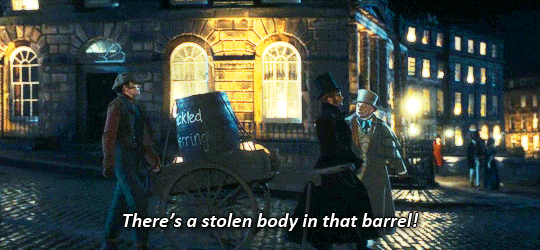
Aziraphale spent that entire time trying to save Elspeth's soul from being damned to Hell.
Every questionable choice he made was done so because he was trying to help Elspeth and also trying to find new ways to decrease human suffering.
He was working really fucking hard to do his job, but he made mistakes along the way because he is constantly struggling with the knowledge that the rules become a lot more convoluted as life becomes more complicated.
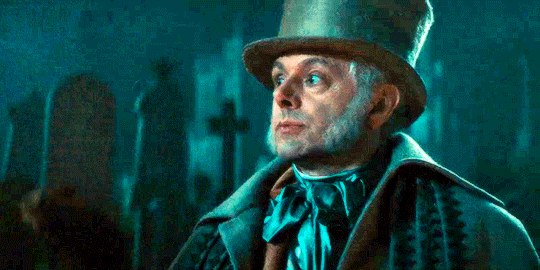
Digging up bodies is wrong, but Elspeth was poor and acting in desperation to take care of herself and Wee Morag so they wouldn't have to continue living on the streets.
He is the one who encouraged her to dig up another body because he realized that Mister Dalrymple was trying to help teach those learning to become doctors so they could do better to decrease human suffering when it was their turn to help others.
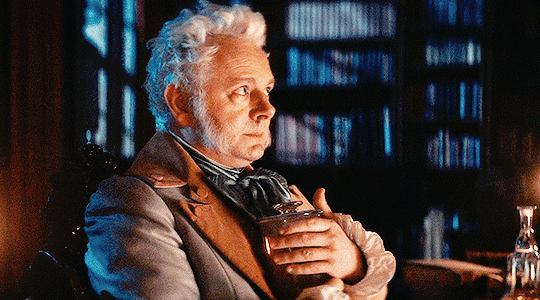
He wasn't able to save Wee Morag after she was shot by a grave gun, and watched in dismay as Elspeth sold her body to Mister Dalrymple so she could get off the streets.
And when that didn't work the way she'd hoped, she decided that her life meant nothing anymore and decided she was better off dead.
Aziraphale had been spending that entire minisode trying to save Elspeth's soul from Hell, but he ultimately realizes that he made things worse even though he was trying so hard to do the right thing.
Heaven didn't care that he failed. Heaven has already said "we're the good guys, we're just not doing anything to stop the bad guys". Aziraphale was doing the job given to him by God. He made a mistake, but he thought he was doing the right thing because he cares about human souls. He still wants to protect humanity from Hell. That's literally his job.
Crowley saw someone digging up a body in the graveyard and immediately realized he didn't need to do anything.
Instead he watches.
He listens to Elspeth and finds it easier to sympathize with her plight because he's in the same boat in many ways. It doesn't matter what he does because he won't be able to climb his way out of Hell.

He listens to Aziraphale and he challenges the angel when he disagrees with some of the things he's saying.
He doesn't interfere with Elspeth or Aziraphale though.
The discussion that he and Aziraphale have with Mister Dalrymple teaches Crowley something just as much as it teaches Aziraphale.
Before he learns the reason that Mister Dalrymple cuts open dead bodies in the first place, he's cheering to the idea of more murder.
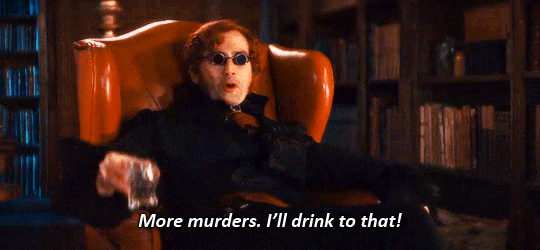
That tumor that Aziraphale hugs to his chest is just as much of a learning moment for Crowley. He hadn't considered why someone might have a good reason to cut up dead bodies, but Crowley and Aziraphale both love children and they both just learned that a child died with a tumor inside of him.
Crowley didn't realize anymore than Aziraphale did just how much danger Wee Morag and Elspeth were in from digging up bodies of rich people.
It was when Crowley saw that Elspeth was about to kill herself that he realized he could no longer sit back and do nothing.
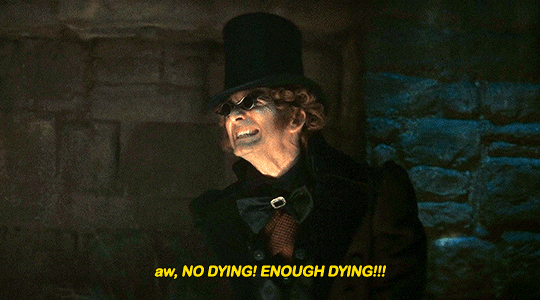
As a demon, it should have been easier for Crowley to accept that Hell was winning another soul, but the truth is that the entire time Aziraphale was working so hard to save Elspeth's soul, Crowley was able to act as a spectator because she was already headed down the path towards Hell.
Crowley had just watched Aziraphale work so hard to save this human soul, this soul who had just lost the woman she loved who was wanting to end her own life so she could see Wee Morag again, and he realized he couldn't sit back and watch anymore. He knew Elspeth wouldn't see Wee Morag again if she killed herself because Hell cares just as little about how complicated human life is as Heaven does.
He used Aziraphale's money to bribe Elspeth into being properly good so she could go to Heaven. He saved her knowing that he was offering the win to Heaven just so she could see Wee Morag again.
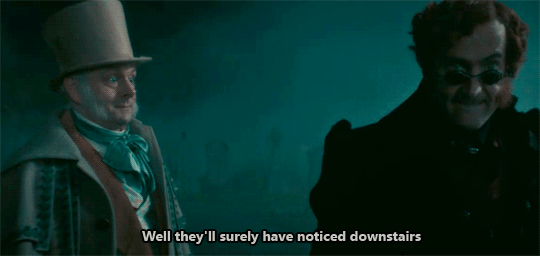
It's important to remember that neither Heaven nor Hell give a single solitary fuck about humanity or the complications that arise as life becomes more problematic. Humanity exists within all shades of grey.
Heaven does nothing to stop Hell. Hell spends eternity torturing humans and other demons. Neither side is good. Neither side is ideal.
And in the end, Crowley did what he did because Aziraphale was doing the right thing by trying to save Elspeth's soul from eternal torment, something she doesn't deserve because she was simply trying to survive in a system that has always put poor people at a disadvantage. Aziraphale learned this too. He learned that there is no inherent virtue behind poverty.
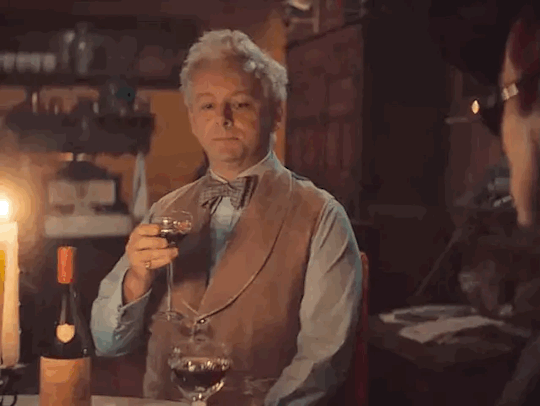
To shades of grey.
#good omens#good omens meta#the resurrectionists#aziraphale#crowley#elspeth and wee morag#heaven and hell#shades of grey
971 notes
·
View notes
Note
Hello Mr. Gaiman, hope this ask finds you in good health, I really need your help.
I’m a law student and currently taking a course on Law and Literature, brilliant by the way. We were given the freedom to chose a theme of our preference on the way law is represented through literature, and I thought Good Omens was the perfect subject for me.
I was interested in focusing on a faulty, inflexible system, especially one heavily influenced (in this case entirely made up) by ‘canon law’ and the way it influences social spheres. The incoherent dichotomy of moral good and bad, the way they influence ethical right and wrong translated into law.
What I was interested in is whether the legal system of Good Omens is based on positive legislation, or more on a customary, spiritual one. The reason why the question arose is the specific scene of ‘The Clue’, where Aziraphale openly ‘acts against the will of God’, and is convinced he will be brought to hell by Crowley. This is interesting to me, because in response he just says that he wouldn’t tell on him, and that was that.
Does that scene mean that angel status is not based on a spiritual(literal sense) monitoring of the soul, but rather about obeying statute and the way it is institutionally evaluated? Is there a set legislation, would it be God’s will? For that reason, would it be ineffable?
I feel like the fact that God is supposed to be omniscient would kind of undermine that theory, but nonetheless I wonder. I suppose that what I’m pleadingly asking for is some insight on the legal frame you maybe pictured for the Up and the Down (do they follow the same general legislation? Is it about legal pluralism? Are they monitored? Is it about lack of sufficient number of managers or oversaturated personnel?).
Pretty please,
A very desperate uni student
P.S. I’m very sorry about the length, I’m not good at summarizing things that I really enjoy. Also sorry for possible writing errors, English is not my first language. (If you see this more than once, sorry. As we’ve already established, I’m a little desperate)
I love these questions. Honestly, I don't think the Good Omens Heaven/Hell system is codified enough for me answer, other than to say both sides are very big on rules and have codes and agreements (see Crowley bluffing in the bookshop) and whatever you put in your essay I promise I will never turn up and maintain that you were wrong.
1K notes
·
View notes
Text
I keep thinking about what slotting the Job sequence in between the Flood and the Crucifixion does for Crowley’s arc, and his relationship to both Aziraphale and heaven.
@amuseoffyre did a great analysis of the importance to Aziraphale's arc here that sparked this thought, but it sent me down a rabbithole because A+C are both having very different experiences here.
Compare how Crowley bounces up to Aziraphale at the flood vs how standoffish he is when the angel shows up to the Job situation. Aziraphale is the one who's all friendly, "Oh it's you!" while Crowley... is pretty businesslike, at least until he gets the chance to start rubbing the reality of the situation in the angel's face.
The flood pissed Crowley off. Job is the first time we start to see the more bitter Crowley we'll get to know. In the Garden he was bemused about overreactions and almost having fun poking this angel with questions about God's plans. Beginning of the flood sequence he was pretty playful. This whole earth thing hasn't been so bad so far, and oh here's that weird angel again, that's fun.
But then he gets hit with God turning on their creation without warning, again. And the flood was at least in God's name ("That's more the type of thing you'd expect my lot to do," he said. Wasn't heaven supposed to be the good guys?). But now with Job? God turns their back and just... doesn't stop hell. Heaven's hands stay clean while hell dirties their evil little claws. Oh, so this is how things are, Crowley realizes. This is the part he's meant to play. Fine.
And seeing how he acts here... I can't help but feel like he'd mostly given up on Aziraphale after the flood. After Crowley went, "Wtf, this is clearly an atrocity," and Aziraphale stuck to "You can't judge the Almighty!" ...well. Giving away the flaming sword was probably a fluke. Just another tool of heaven, that one. Disappointing, but what should he have expected?
So all through their Job interaction he plays up his demonicness, trying to force Aziraphale to toe the party line and prove Crowley's new view on things right, once and for all. But there is a crack there, because not-so deep down Crowley would love for Aziraphale to surprise him again.
(After all... he is lonely. Try some wine with me, or have an ox rib, angel.)
(Fascinated by the difference in Crowley's gleeful "That's just how it started for me, see you in hell" vs. "I'm not taking you to hell, Angel. I don't think you'd like it." And only admitting to the loneliness once he isn't totally alone anymore; I think the original lie was more to himself than anything. He's angry, he's bitter, these righteous angels shouldn't think they're any better than him, not when they can doubt too. But when it comes down to it? No, I don't actually want to drag you all the way there. Something about guns and miraculous escapes, and his comment about Wee Morag, it's different when it's someone you know, isn't it. Hm. Anyways.)
By the end of the Job situation they have a moment where they confirm they are more similar than they thought. But it's not a happy thing. It won't be until Rome when they start enjoying each other's company just for the sake of it. So at the crucifixion Crowley comes up to Aziraphale still prodding at him. You happy about this, Angel? You smirking over how righteous it is? But now instead of, "You can't judge the Almighty," we get "I'm not consulted on policy decisions." Implying he disagrees without really saying it. And that's enough for now, Crowley will take it.
From the flood -> Job -> crucifixion -> Rome, we see Crowley get angry, then more and more resigned and bitter. Until Aziraphale reaches out and pulls him out of it.
#i like how the Job sequence both shakes things up and doesn't at the same time#it's not totally necessary to make the arc work but the context helps you understand so much more#good omens#good omens meta#good omens 2#good omens spoilers#crowley#v watches good omens#job flashback
2K notes
·
View notes
Text
we really need to be able to separate "demon as species" and "demon as political affiliation" in good omens, because that is at the core of why so many people (including the characters in the show, especially aziraphale) are reluctant to acknowledge crowley as a true demon.
demon means BOTH "an angel who has fallen from heaven, has an animal aspect, and is weak to holy water and resistant to hellfire" and "an employee of hell who is loyal to satan." there is one word for both of these concepts. crowley fits one, but not the other. it's why he's simultaneously a "former demon" by his own words and also incredibly resistant to the idea that he is anything else.
not working for hell doesn't mean he's not really a demon. it doesn't mean he's in any better standing with god. it doesn't mean his fall wasn't something that changed him deeply, both on a physical level and as a person. it means he is struggling to find the vocabulary to define himself, because the system is not built for someone like him. it is impossible, in the minds of every character in the show except for crowley, to be a demon without being one of "the bad guys." it's impossible to have fallen without joining team hell.
the same is also true of angels. michael refers to aziraphale as a "former angel" in the same episode that crowley refers to himself as a "former demon." I don't think aziraphale would ever use that language for himself--he's very attached to his identity as an angel, and the closest he ever gets to calling himself anything else is when he's so upset at the end of the job minisode--but just as there's no word for a demon who is not associated with hell, there's no word for an angel who has been alienated from heaven.
but these identities still mean something for both crowley and aziraphale. a huge part of crowley’s personality and his moral code is his resistance to authority and his disdain for rules and predestination. likewise, a huge part of aziraphale’s personal code is still his allegiance to some sort of “greater good,” whether that be god or just a nebulous concept of a heaven that doesn’t exist.
and in addition to the philosophical divide, there are real tangible differences between the angel crowley used to be and the demon he is now. the distinction between “angel” and “demon” is not important in that it dictates whether a celestial being can be Good or Bad, but it is important in how it functions as a descriptor of the person’s prior life experiences, their relationship with god, and their physical characteristics.
500 notes
·
View notes
Note
drop your favorite good omens fics pls babe
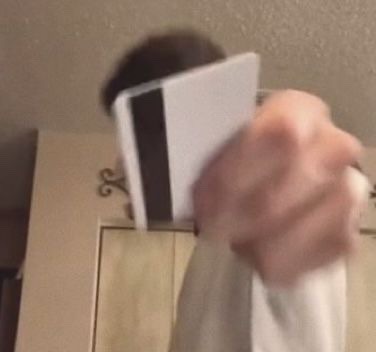
I’ve only just dipped my toes into the fandom so i haven’t read NEARLY enough to make anything that one could call a rec list but oops my finger slipped
Here’s a hilarious short fic i just read where aziraphale and crowley confess to each other but they both think the other is talking about a different demon / different angel
These post s2 bad communication fics are shamefully underappreciated and deserve more kudos and comments
Ohhh this little delicious fic where crowley pretends he doesn’t care about a fallen aziraphale to save him in hell
Yes i AM one of the ten thousands of people who have read and loved the crowley therapy fic
Aziraphale takes crowley on dates but misunderstandings ensue omg this fic deserves so many more readers
This fic is pure poetry i’m telling you the writing… omg. Beautiful retirement aziraphale and crowley forever rec
I canNOT stop thinking about this loophole sex fic which is SO tender and SO emotional and all the things. All. The. Things.
People please reblog or comment with more recs i really wanna read more but i don’t know where to start. Self recs are allowed btw. In fact i should mention my third wheeling jesus fic
#or reblog this post without recs bc it’s always good to reblog fic rec posts and get more readers to authors#good omens#good omens fic recs#good omens fanfiction#ineffable husbands#aziracrow#fells book club
1K notes
·
View notes
Text
“I don’t think that is what God wants. And I don’t think you want it either.”
This line of Aziraphale’s in the Job minisode keeps sticking out to me. Because this is the heart of the problem, right? This is how Aziraphale can see Crowley so completely and also not at all.
Because yes they suck at open communication and yes it’s because they had to hide their relationship for thousands of years and have so so so much trauma and fear to work through. But ALSO they actually do have a profound difference in how they see the world that keeps coming between them, and it’s not just theoretical but deeply personal to both of them.
Because Aziraphale still wants to believe that God is good. He can’t let go of that because his whole identity is wrapped up in being an angel of the Lord, and if God’s not good then what has he been doing for his entire existence?
And so when bad things are happening he falls back on This cannot be what God wants. The whole of season one, he refuses to believe that God could really want the world to end—even though we now know he knew this was a possibility before the world even started. He keeps going up the chain of command, trying to find someone to intervene. “That’s why I’m going to have a word with the Almighty and then the Almighty will fix it.” As if God doesn’t have all the information or hasn’t been paying attention.
And really, the events of season one reinforce this worldview for him. Because if the Archangel Fucking Gabriel isn’t sure what God wants, then maybe God did want them to stop Armageddon. Maybe it was Aziraphale and Crowley who were doing God’s work after all.
He’s gotten as far as realizing that Heaven’s orders are not the same thing as God’s will, but he still hasn’t detached the concepts of Good and Right from God in his worldview.
Crowley is a good person who does the right thing so he must still be an angel deep down. “I know the angel you were.” The only way Aziraphale can conceptualize Crowley saving Job’s children is, “Come on, you’re a little bit on our [God’s] side.” So Crowley’s fall was a mistake; Crowley belongs in Heaven, where he was so happy before the Fall. Why wouldn’t he want to be an angel again? And yeah maybe Heaven sucks now but God is still good, so there’s hope that the system can be reformed with a change of leadership, and Heaven can be made to actually do good, the way God always intended.
But that’s not how Crowley sees the world at all. He is operating with an entirely different understanding of reality. Because he figured out a long time ago (at least by the time of the Job job, but probably long before that) that you can’t base your sense of morality on what you think God wants. Not just because you don’t know for sure, but because sometimes God’s plans are fucking awful. God in Good Omens is not kind to Her creations. She doesn’t tolerate questions or doubts or disobedience. She’s capricious, turning on the creatures She made and killing a bunch of them when She’s in a bad mood. She punishes indiscriminately and disproportionately. She wagers human lives like gambling chips. The kids were supposed to be dead no matter who won the bet.
I think it’s interesting that Crowley is the one who introduces the idea in season one of “What if the Almighty planned it like this all along? From the very beginning.” That’s probably a comforting thought to Aziraphale, soothing his anxieties about going against Heaven right when he is feeling acute distress at the idea of no longer having a side. (And, in that particular moment, no longer even having a bookshop.)
But it’s not a comforting thought to Crowley. Have you seen what happens when God has a plan for you? It fucking sucks. Woe betide you if you’re the Barbie God decides to play with today. (At bare minimum, you’re coming back with some burn marks and a weird haircut.)
I’ve brought up the line “There are no right people. There’s just God, moving in mysterious ways and not talking to any of us” before, and I tend to focus on the “there are no right people” part. But also, there’s just God.
Aziraphale tends to draw a distinction between God’s will and Heaven’s orders when it suits him, and collapse that distinction when it doesn’t. Crowley almost never differentiates between God and Heaven. There’s just God, and She’s not going to explain why this is happening or listen to pleas for mercy (although Crowley still tries). You can’t trust Heaven or Hell, and you can’t count on God to show up and make everything all right. Sometimes God is in fact the reason that things are not all right. You’re on your own.
(And. Look. Crowley is right on this one. There are certainly aspects of their relationship where they’re both equally responsible for things being a shitshow, but the text is pretty unambiguous about Crowley, a demon, having the most accurate read on the nature of God in the world of Good Omens out of any of the metaphysical characters.)
Crowley rebuilt his entire sense of self, alone, after the Fall. He created himself anew and developed his own moral compass and sense of identity independent of both Heaven and Hell. “The angel you knew is not me.” When Crowley does the right thing, that’s not his angel-ness shining through; that’s just Crowley.
And from a like, trauma recovery point of view, it’s actually very healthy for him to have the realization that sometimes God’s just kind of a dick. He didn’t do anything to deserve getting kicked out of Heaven. None of them did. Just God messing them about because She didn’t like being questioned, or She wanted to see what would happen, or She needed two sides for Reasons and didn’t much care who was on one or the other, or She’s playing some fucked up little game for Her own amusement. (And if there was some Great Plan that required Crowley to fall…well, that is also fucked up. Because it doesn’t matter if there was a reason. It still hurt.)
And while Crowley in general is extremely patient with Aziraphale and his slow, halting journey away from Heaven…it’s gotta sting, every time Aziraphale doesn’t want to believe that God could be cruel, when Crowley is standing right fucking there. It’s gotta hurt when Aziraphale refuses to see something that Crowley knows to be true through his own lived experience. Because it should be enough. What happened to him should be enough to make someone who loves him walk away from Heaven and never look back. And it isn’t.
But of course Crowley is one hundred percent not going to talk about this, if he is even fully self-aware about having these thoughts, because it’s far too painful and vulnerable. (He talks to plants, goats, God, and no one in a bar at the end of the world, but never to Aziraphale.) And so he says “Tell me you said no” and “I think I understand a lot better than you do” because he can’t say Choose me. Just this once, choose me and he can’t say Believe me.
And Aziraphale is not going to think about all this and work it out for himself, because he has a massive lump of denial centered around exactly this thing, that sometimes God hurts people who didn’t do anything to deserve it. I’m sure he’s thought about the Fall in abstract terms, enough to be afraid of it, but not in terms of this is a thing that happened to a person I love. And he has certainly not allowed himself to draw any conclusions about the nature of God from it, because that is far too scary a prospect.
And so they’re stuck. Until they can figure out how to remove this massive landmine from the center of their relationship, they are going to keep having the same fight over and over again, and they’re going to keep hurting each other without fully understanding why.
#do you know HOW HARD it is to write genuine ideological conflict that also feels deeply personal?? and they did it SO WELL#i am in awe tbh#good omens#good omens s2#ineffable husbands#crowley#aziraphale#heaven#hell#god#the god in good omens is not nice and you can’t convince me otherwise#is a tag i have from s1 and i’m sticking with it#fall thoughts
1K notes
·
View notes
Text
God. I. I absolutely cannot sleep. And it’s nearly morning.
GOD.
Aziraphale, no.
Aziraphale. You are being manipulated. You are being showered with praise and acceptance that you have never received before, not like this. You are being told that you did extremely well, that you are the best of the best. This is *deliberate*. Metatron has never been on your side, he is telling you exactly what you want to hear. What you’ve been craving for the last four years, and for the six thousand years prior.
But they have plans for you, Aziraphale. They want you Upstairs so that you could do exactly what they need.
Aziraphale, stop.
(I’ll have to rewatch this. Have to collect the instances where Aziraphale is looking for approval. Fiercely hoping for approval. Throughout history, yes, and recently, too: those telephone calls after the Armageddon’t where he wanted Crowley to witness the good he’d s been doing. That burning need to tell someone that he did well and to hear it acknowledged.
Oh, Aziraphale is not at all taking his retirement from Heaven well.)
GOD.
You know what, I think Aziraphale is absolutely coming undone by the end. That process is certainly in full swing by the ball.
Because seriously.
The ball. The absolute fabulous madness of it. The drapery. The chandelier. Aziraphale going all-out with the miracles, retreating to the safety of Jane Austen where things go right and love prevails.
(Inviting Crowley to dance, too. Pulling him by the hand.)
Notice, too, Aziraphale’s desperate insistence that things cannot possibly be as bad as Crowley thinks they are. What a level of denial. Everything is fine, he is telling himself. Everything will be fine. I’m setting everything up perfectly to explain the big miracle, to avoid the existential threat we are both facing. We will be fine, nothing will really have to change, and I will still have Crowley.
(Oh, the vehemence. Close your eyes and pretend you are in another century. Don’t open them. Do not open them. Everything is fine.)
And—
Aziraphale is not handling retirement from Heaven well, but that’s only one of the things that are happening, isn’t it.
The danger to both of them is real. Crowley, too, is under existential threat (which Shax has helpfully reminds Aziraphale of, of course she does). They are not safe; they will never be safe while they are exiles, while Heaven and Hell can threaten both of them on a whim, while shining archangels can drop by at any point.
So what Metatron is offering at the very end is the power to do good and be appreciated, but also safety. You can be safe, he promises, your demon can be safe. You can even be with him, just as you are now—except you won’t be powerless against the rest of the world.
You won’t have to be fugitives, not any more. Not like you are now.
(It’s a lie. We know it’s a lie.
And Metatron must know full well that Crowley would never accept the terms as stated.)
They witness another thing, of course. Gabe and Beez. Their happily-ever-after.
There in the moment, Crowley is probably looking at them and thinking: we could do this. We could go off together. Yes?
Except this kind of a happy ending, Gabe and Beez being left alone but exiled, wouldn’t be a happy ending for Aziraphale and Crowley.
They’ve been in this exact place before. “We can go off together!”
And as before, this won’t work.
They have the Earth. They care about the Earth a lot, both of them. Aziraphale wants to win approval, yes, but he also very sincerely wants to make things better, to do what’s right, to be the change. And he wants, too, to win safety for him and Crowley. Wants them to be together, side by side; wants that to be allowed.
Wants them to do the right thing together. To have the power to do the right thing.
And everything they have built together falls apart.
(Angel.
Fucking Hell.
Stop the elevator between the floors. Get out. Get the fuck out. Get back.
Angel. You haven’t even seen what Crowley has seen in Heaven. What they were planning. What they need you for.
Angel.
NOT. LIKE. THAT.)
#good omens season 2#good omens#good omens season 2 spoilers#GOD#episode 6#and really all the other episodes#good omens 2
1K notes
·
View notes
Text
Right to fear, wrong to believe
Just had a horrible realization and needed to meta it out.
How different they were before Edinburgh, when Crowley was sucked down into Hell.
Look at this flirty babygirl in the Bastille:
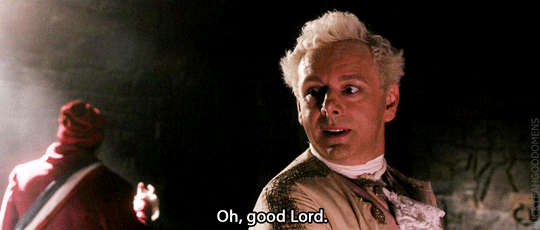
I mean could he climb that tree any faster?
(This is why I really like fics that place a more physical relationship here, pre-Bastille or just post-Bastille, because c'mon look at them. )
In S1 the next thing is 1862 and Crowley asking for insurance (with a cane ffs). And Aziraphale freaking out with his "fraternizing" BS. It's jarring, until we get 1827 filled in for us in S2.
@takeme-totheworld notes in this post:
Crowley sure went from "our respective head offices don't actually care how things get done" and "nobody ever has to know" to "walls have ears" FAST after Edinburgh. And Aziraphale went from looking at Crowley with hearts in his eyes to "I've been FrAtErNiZiNg" just as quickly.
I'm more convinced than ever that Edinburgh was the first time Crowley ever actually got caught and punished for fucking around with Aziraphale/doing good deeds/whatever it was they yanked him back down to Hell for, and it scared the absolute shit out of both of them and changed the whole tone of their relationship after that.
Yes! - it's clear to me as well that the Edinburgh graveyard was a very bad turning point, where they both saw that Hell was listening and would intervene. And it did change their relationship drastically, for over a century and a half (really, until looming Armageddon loosened up the stakes for them).
But what about Heaven?
See the thing is, we know Azi's been worried about Heaven watching him for the past 6000 years.
But they haven't.
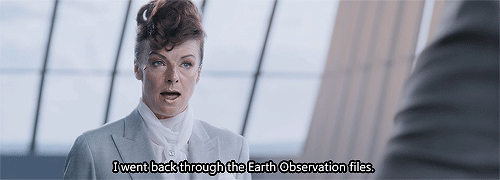
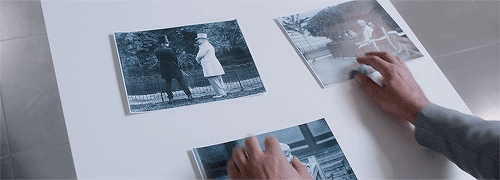
[GIFs posted by starrose17]
All this time, and Heaven had not seen them together. Hadn't noticed. Had not even LOOKED.
I want to mention what @starrose17 says about this here in this post:
What I love about this is her choice of words, “went back through the Earth Observation files.” This implies that these photos were already filed somewhere meaning somebody had to have been watching them which meant somewhere in the depths of the bureaucratic heaven there’s an underpaid angel clerk tasked with watching angels on Earth, and he’s been hording photos of his favourite Angel/Demon couple not reporting them to Michael because he wants to see what happens.
And that's exactly what this fic covers!: Spying Omens by @ednav
(Give this a read, it's fabulous.)
While I am here for this being exactly how that happens, the other scenario is colder and worse - there's no one watching, at all. It's just filing automatically and never seen until some Scrivener is called to pull a file.
From @fuckyeahisawthatat's comment here :
I found this scene to be quite chilling, actually. Not only is the idea of Heaven as a surveillance state brilliant (way to make “God is always watching” sound way more ominous) but this is exactly how modern surveillance states work.
They don’t actively watch everybody all the time. That’s not physically possible for humans, and even if it is metaphysically possible for Heaven, it’s not a very efficient use of resources. Surveillance states watch people they deem “suspicious.” And once you’ve been put in the category of “suspicious,” they have massive amounts of data that they can comb through to collect a lot of information about you–to retroactively build a case justifying why you’re suspicious, to collect information about where you go and who you associate with, etc.
Yes.
So we either have secret collusion in the rank and file, or we have a surveillance state that is constantly reinforced to its subjects for fear's sake, for control.
(Well, it obviously could be both.)
BUT my point is… Up until Edinburgh, Hell has not been watching (or caring at least). And up until near the end of Armageddon't, neither has Heaven.
Oh, my poor Angel. Thousands of years, of denying yourself, of pushing Crowley away, of carrying around a tension that is it's own constellation.
After 1827 you might have reason, but for the 5000+ years before that?
Thousands of years and Heaven was not watching nor cared.
You were right to fear. And you were wrong to believe.
And that just breaks my heart.
#okay gonna go reread Spying Omens again because that's my headcanon now#I hope Azi tears out the Earth Observation cams or servers or whatever it is#where's Murderbot when you need a good hack#good omens meta#aziracrow#ineffable husbands#good omens
295 notes
·
View notes
Text
It’s time to talk about the Laudanum Lesbians, Elspeth and Wee Morag. Right away, it’s pretty obvious that you’re supposed to draw parallels between them and Aziraphale and Crowley. When the viewer first meets Elspeth, we get this gruff girl who threatens the two of them and is established to be doing something “morally wrong”. Life hasn’t been kind to her, and she clearly doesn’t trust people. To really drive it home, she and Crowley are on the exact same page while they’re talking to Aziraphale and wheeling the body to the alley.
Then we meet Wee Morag, and it becomes apparent that every decision that Elspeth makes is to better their life together. She offers Wee Morag food (which is something our favorite demon is wont to do for his partner) and specifically oversells it as something fancier than it actually is. Wee Morag calls her an angel. It’s meant to be a little tongue and cheek since it’s in the presence of a literal angel, but it also serves as a way to show that while Elspeth may not be a Good person, that she at least cares about the person close to her.
Now for Wee Morag at this moment, we don’t get much from her aside from her obviously being the moral compass out of the two of them. She tells Elspeth that she's going to Hell literally two seconds after referring to her as an angel. The more important part of this interaction I would argue is Aziraphale’s response to Wee Morag. Some part of him recognizes a kindred spirit in her. He takes off his hat in a show of sincerity and says that it was lovely to meet her. This is important for later in the episode.
After they fail to sell the body, all three of them end up back in the alley with Wee Morag. Elspeth is again choosing to not trust Aziraphale despite his change of heart to do what he now knows is actually a good thing. Wee Morag starts off on the fence, worried about those souls that won’t get into Heaven. Elspeth tells her that she promised to help, and through everyone’s various methods of convincing (tempting may even be the better word as there is a demon sitting next to her when she agrees), Wee Morag says that she’ll do it because that’s what friends do. Regardless, she’s now had her change of heart. Although I would say hers is more driven by the same thing that drives Aziraphale to help with the Antichrist. It is fundamentally for her and Elspeth’s benefit, not the Greater Good per say, but she needs that reframing of doing the moral thing of upholding her promises and potentially helping people.
In the graveyard, Elspeth does all of the hardwork and Wee Morag holds the light both to assist how Elspeth sees, but also likely to help her keep watch. She’s filling a guardian role for Elspeth. Later when Elspeth sells her body, she even says “She only wanted to look after me.” Upon seeing the actual body (a priest’s body no less), Wee Morag realizes with horror what they’re doing - the potential moral ramifications stare her in the face. She ends up caught in the crossfire of a gun, and she dies for it.
Originally, I thought that Wee Morag’s death sets Crowley up to worry about what might potentially happen to Aziraphale in the future. In a way, I still think it does. She was the Good character helping the Bad character, and she pays dearly for it. His line “It’s a bit different when it’s someone you know, isn’t it?” while pointed at Aziraphale can be felt by everyone in the room. Elspeth has been dealing with death this whole episode, but her whole life is turned on its head when her ‘pal’ dies. Crowley recognizes that it’s the knowing part that actually causes something to hurt. (It’s one of the reasons why he doesn’t have many human friends. He does have a friend though, and it would absolutely gut him to lose him.)
The episode isn’t over though. We still have to watch someone else pay for stepping over the imaginary boundary of Good and Evil, except rather than it being Aziraphale, it’s Crowley. Like Wee Morag, he steps out of his usual role and helps Elspeth, and for that, he pays dearly. He gets dragged off to Hell to have whatever Demons do instead of a rude note done to him. After everything that’s happened, it’s no wonder why you get that panicked shout of “Crowley” from Aziraphale. They just watched the worst case scenario happen for people like them.
Also as another quick fun aside, both sets of characters are bound by something that allows them to not be able to carry out their actual dreams and goals. Elspeth and Wee Morag were bound by poverty while Aziraphale and Crowley are bound by their respective Head Offices.
#The 1941 minisode is probably my favorite#And I love the Job minisode#But I feel like we're sleeping on this one when it's just as good#good omens meta#good omens#meta#good omens season 2#Aziraphale#Crowley
595 notes
·
View notes
Text
The 3 Falls of Anthony J Crowley
So far, Crowley has told three different stories to three different audiences about why he Fell, and there's some important information that can be inferred from them. Let's get nerdy.
(Nb. C. 25% of this is from a previous post I made about Crowley's memory problems.)
Here's Crowley's 1st story (gifs courtesy of Fuck Yeah Good Omens), in 1867:
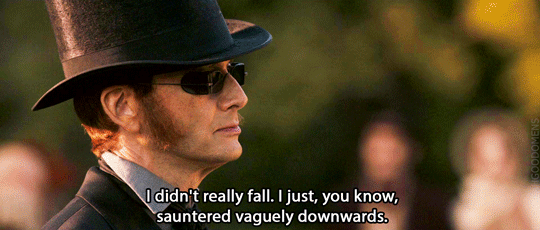
In Book Omens this line is narration about Crowley, and means that Crowley didn't embrace evil and side with Hell so much as he just wasn't into the whole Heaven shindig.
In Show Omens, this phrase becomes a little more fraught, because Crowley says it about himself, and he says it to Aziraphale.
Aziraphale has just disagreed with Crowley's assertion that the two of them have a lot in common. Az thinks Crowley means their origins as angels, and demurs, "I don't know. We may have both started off as angels, but you are fallen."
But what Crowley means, as we find out in pretty much every other scene the two of them share in S1 and S2, is that that he and Aziraphale have a lot in common now, in their current positions. He wants Aziraphale to see him as a friend--and to be his friend--so he elides the difference his Fallenness makes to Aziraphale, all "Ehhh, it wasn't really a fall kind of Fall, it wasn't that bad."
Also, given the conversation they have in the Final Fifteen, I feel like his phrasing is kind of important here, because falling is not voluntary, but sauntering is. In saying this Crowley is claiming that to some degree he chose to reject Heaven.
It's entirely possible that Crowley may have been lying to Aziraphale in 1867--he is, as he says, a demon, and he's lied to him before to make something bad seem less bad--but maybe not. Remember what the Metatron says about Crowley:
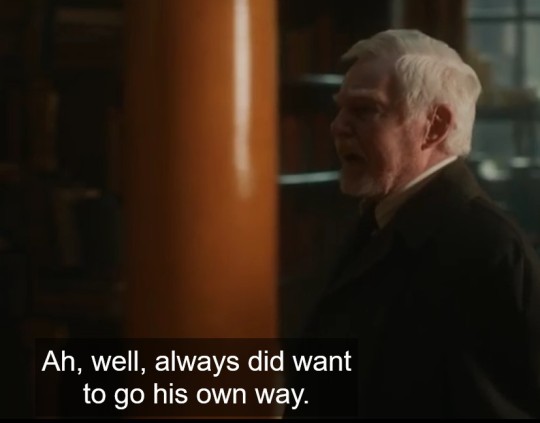
And this is another interesting point: The Metatron knew Crowley as an angel. The Metatron. The being who, after shepherding Aziraphale out of the bookshop, turned back and looked at Crowley with hate.
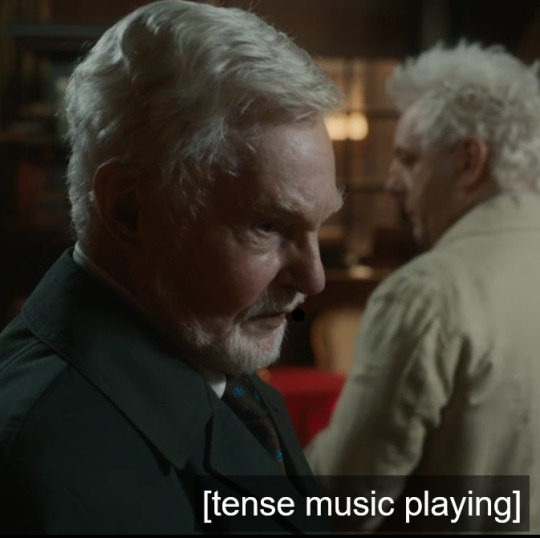
(And tense music playing, in case you weren't sure.)
So maybe that's it. Maybe Crowley just chose to be on his own side.
But in 2019, and addressing God, Crowley's story of his Fall is slightly different:
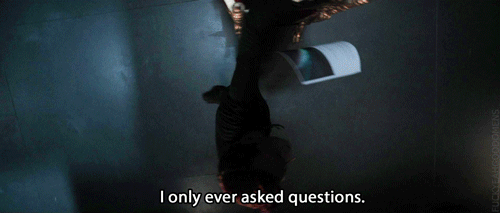

I think we can take this as Crowley's sincere belief. It's unlikely that he would lie when speaking to God, because that is Aziraphale's job because he doesn't have any reason to do so: God hasn't been listening to Crowley for 6,000 years at this point, and if She were listening, lying would not work. So Crowley probably believes he's telling the truth here with this story: Crowley believes one reason he Fell is that he asked questions.
But is he right?
Another line from the Metatron:
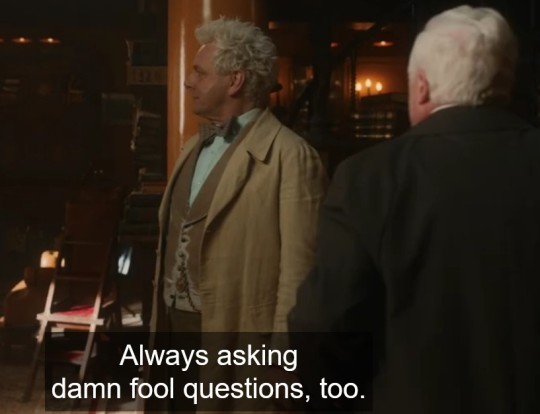
The Metatron seems to speak of Crowley's habit of asking questions as though he finds it obnoxious rather than damning, so maybe the questions weren't the problem. Then again we know that the Metatron is a lying piece of shit and an authoritarian who doesn't want his regime questioned, willing to erase memories and destroy lives to cover up the 'institutional problem' that Heaven doesn't know what the Plan is and is run by a handful of warmongers who want everyone dead or indentured.
Either way, this is the third time in the series someone has talked about the problem of Crowley asking questions, so my guess is his questions were probably a salient feature of his Fall.
Onward!
Before we look at the 3rd story, remember that we have strong evidence now that Crowley has had his memories erased by Heaven.
But we also know Furfur, another demon, still has his memories. Inference: Heaven don't erase the memories of every angel who Falls. This suggests that Heaven erased Crowley's memories because he had knowledge in those memories Heaven didn't want him to have anymore.
This may not be specific knowledge. We know Crowley has a high security clearance in Heaven and therefore must have been a high-ranking angel, and we know he created a nebula with Saraqael, so presumably there was a lot of stuff in his head Heaven wanted stripped out.
But I think there was something specific, and here's why. Firstly, there's no reason to assume that importance in Heaven is a guarantee of importance in Hell. Furfur could have been a high-ranking angel too before ending up an admin in Hell. (Hell does not seem to be any more of a meritocracy than Heaven does.)
Secondly, it's clear that Crowley doesn't know his memories have been erased. If he knew, then when Furfur says "We were in the same Legion? Just before the Fall? Doing dubious battle on the Plains of Heaven? Remember?" he'd say something like "Don't be stupid, of course I don't remember, Heaven erased my memories."
Instead he says,
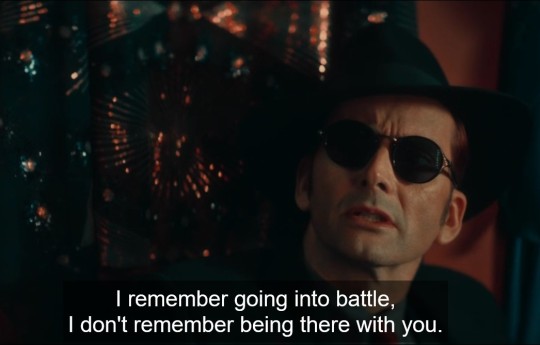
Now, maybe Crowley is just being a dick here. Certainly we're supposed to take it that way until he goes up to Heaven with Muriel and doesn't remember Saraqael either.
But what if he's being truthful? If Crowley is being honest (and a dick), that would mean the Fash didn't erase all of Crowley's memories of his time in Heaven. We know this because Furfur says he and Crowley fought together "on the Plains of Heaven," and "just before the Fall" [emphasis added].
This suggests that Maybe Heaven didn't erase time from Crowley's memory. Maybe they erased people.
Okay, now here's Crowley's 3rd story about how he Fell:
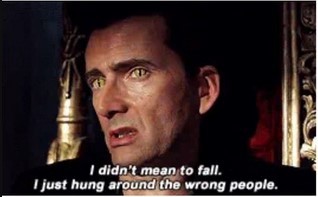
It's a cute line, but what if it's not just a throwaway joke referencing what people say about kids who go down the wrong path and become criminals?
Crowley mutters this 3rd story to himself, so we can be confident Crowley believes this to be true. But Crowley doesn't know who the wrong people are. He doesn't know whose company got him thrown out of Heaven, because his memories of all those people have been taken from him.
And taken together, these three stories and Crowley's stolen memories suggest a bigger, more disturbing inference: Crowley doesn't know why he Fell. (Or sauntered vaguely downwards.)
Like Crowley, Job was once a favorite of God. But he has fallen out of that favor and been delivered to demons for reasons God refuses to tell him.
We the audience are meant to draw a parallel between Job and Crowley. We know this not just because of the speech Crowley cathartically gives Job's goats, in which everything he says to the goats can be just as easily applied to Job or himself, but from two other indications. Here's one:
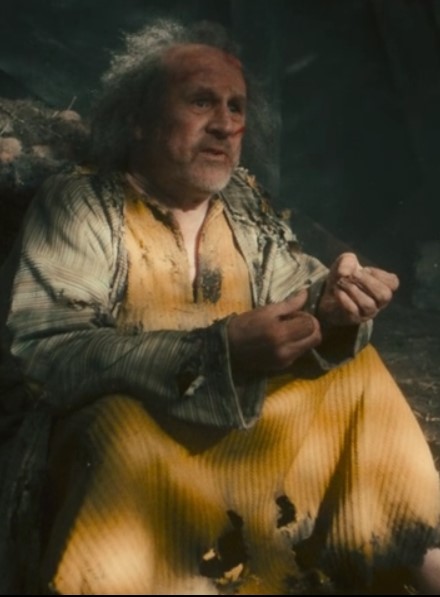
Job is wearing Crowley's color.
The other is the minisode title, "A Companion to Owls." This phrase comes from the Book of Job, specifically Job 30:29. Job, lamenting what has happened to him, says,
I am a brother to dragons, and a companion to owls.
In Biblical symbolism, dragon=serpent=snake=demon. And in some Mesopotamian beliefs--one of them Judaism--owls were associated with demons as well:

and

and

So the Job of the Bible is saying in this verse the same thing the Job of Good Omens says: God has forsaken me and delivered me to demons. Or even: God has forsaken me and I am now being treated like demons are treated.
And he's also saying something else. In the Bible, owls symbolize loneliness, desolation, and solitude. They're consistently depicted as living in barren, abandoned, isolated places. Seriously. Go search owl(s) in a Biblical concordance and read all 30 entries: it comes up a lot. If you're a companion to owls, you're alone (except for the owls) in the wilderness. You're forsaken.
WHOMST do we know whose signal color is yellow, who's a brother of demons, and who admits at the end of the episode that being alone and forsaken in the wilderness is lonely?
So. Job, a character whose claim to fame is that God punished him and he didn't know why, is a mirror character to Crowley. This on its own isn't enough to say definitely that Crowley doesn't know why he Fell, but combined with the three different stories he tells about his Fall, I think there's enough textual evidence to conclude that Crowley isn't entirely sure why he fell; he only has educated guesses. Either he knew and the memory was erased, or he was never told at all.
My question about Crowley's Fall is this: Who pushed him?
Was Crowley's Fall an act of God Herself, or was it an act of Heaven? What did the fucking Metatron have to do with it? What was Crowley's crime? When Aziraphale takes charge of Heaven and the Second Coming, will he read Crowley's file?
#good omens#good omens 2#good omens s2#good omens meta#crowley#aziraphale#the metatron#good omens analysis#crowley's fall#3 falls of crowley
620 notes
·
View notes
Note
I remember a fair few fics where the premise is vaguely “Aziraphale does a blessing/miracle/other religious thing on Crowley and it’s strange/overwhelming/etc for all involved”. I just can’t… find any of them. I remember them being various ratings, pure fluff to pure smut
Your best bet is the divinity kink tag on AO3. Here are some to get you going...
The Agony And The Ecstasy by entanglednow (T)
A split second decision by Aziraphale to save them both from discovery leaves Crowley experiencing something he is unprepared for.
your love is sunlight by EveningStarcatcher (M)
“Why wait?” Crowley’s voice was faint, almost a whisper, but lined with the usual forced nonchalance.
“What?” Aziraphale froze, brow slightly furrowed.
“Just, I don’t have to wait.” Crowley’s cheeks flushed. “Could be all better right now. I mean. I-if you wanted.”
“Are you asking me to heal you?” Aziraphale’s eyes flashed with something… divine.
A Negative Integer by racketghost (E)
“I’m the holy object,” Aziraphale says, and is also looking frantically around the room, the bookshop, the skylight filtering in the first glimpses of afternoon sun and holding dust particles suspended in their beams, dreamy and soft. “I can’t touch you.”
“Yes you can,” he blurts out, and swallows down the cacophony of what are sure to be any number of embarrassing and hopeful ways in which the angel can touch him, really, whenever.
Bleak Without and Bare Within by Princip1914 (E)
Perhaps Crowley was right, Aziraphale thought. They were both working very hard in sometimes very awful places and for what? It was obvious that they couldn’t give up on temptations and blessings entirely--someone would notice, they had to surely--but combining forces here and there? What had Crowley called it, lending a hand, when necessary? It didn’t sound too bad. It didn’t sound like a good idea either, but Aziraphale supposed that was the whole point. It was a morally neutral proposition, and everything would still get done in the end.
“I agree.” Aziraphale said finally. “As long as you accept that we’re going to have to teach one another.”
Or, an angel learns to Tempt, a demon learns to Bless and things get a bit out of hand at the beginning of an unusual Arrangement.
Divine Hands by WanderingAlice (T)
After the end of the world didn’t come, Crowley had planned to spend a lot more time with Aziraphale, and Aziraphale didn’t seem opposed to the idea at all. Unfortunately there’s one glaring problem. Crowley has a strong, uncontrollable panic reaction to being touched by something divine. And Aziraphale cannot turn off his own divinity.
A Good Omens Holiday Exchange fic written for the prompt: After the Notpocalypse, Crowley and Aziraphale start getting closer...but they find out together that Crowley has deep-seated trust issues triggered by something about Aziraphale that he can't help. They have to overcome it together.
sanctuary by moonyinpisces (T)
“You’re staring.”
“Oh dear,” says Aziraphale, completely unapologetic. “How rude of me.”
Crowley begins to smile something slow, bright, and lovely, but he schools it with a bite to his lower lip. Aziraphale thinks of the way he looked two millennia ago, pressed up against the wall with Aziraphale's blessing healing his wounds, the only demon to experience divine ecstasy and live to tell the tale. How Aziraphale's hands itch to do it again, and again, and again. Crowley opens his mouth as if to say something, but then stops and spins around instead to go back to stirring the curry.
“Shut up,” he says to the stove, flustered.
- Mod D
429 notes
·
View notes
Text
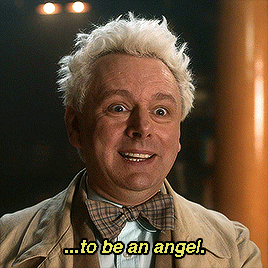
Okay so I know that we’re all upset at Aziraphale for this because of very obvious reasons. But can we take a minute to really look at where exactly he’s coming from? Because we only have Crowley’s perspective on the fall because we’ve only ever seen Crowley talk about it before. At least in his vague but colorful ways. Ex; Sauntering vaguely downwards, boiling pool of sulfur, etc.
But this season we get a little bit more on what Aziraphale thinks about Crowley becoming a demon.
And well. Aziraphale thinks that it was a mistake. More below the cut…
Full stop. Aziraphale thinks heaven was wrong about Crowley. He thinks God was wrong about Crowley. We see this in a few key scenes in both Seasons.
Let’s go Chronologically.
Job. Because I’ll never stop talking about the Job minisode. When Aziraphale’s caution is ignored in heaven, he goes to convince Crowley to stop and ignore the will of Heaven and Hell. (He doesn’t take into account that if Crowley doesn’t do the killing, another entity undoubtedly will.)
It’s the “I know you” and “I know [who] you were.” It’s the “I don’t think you want to do this.”
He had faith, even then, that Crowley would do what was right.
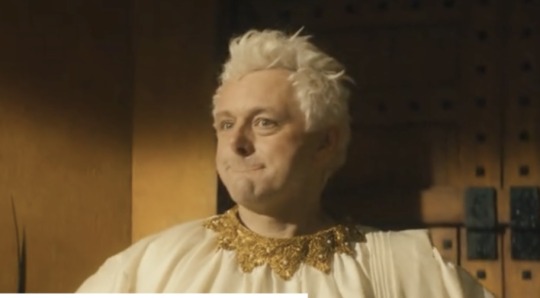
It’s the absolute and joyful giddiness of finding out that he’s right. That Crowley saved the goats, and probably the other creatures. That Crowley is going in that very beautiful house in order to save the children.
It’s the tragedy of Jemimah asking if Crowley is a demon and Aziraphale answering “Technically”. Crowley answers too, and he knows that there’s nothing technical about his state of being.
It’s the “you’re a little bit on our side”. And for all that Crowley denies, denies, and denies—Aziraphale doesn’t actually hear him. He hears “Yes. But I’m not an angel though, am I?” Aziraphale interprets, “I’m on my side” as “I’m not permitted to be on heaven’s side”.
In Rome, he extends Crowley an invitation to eat with him. He forgets himself. Tempting is Crowley’s job. He has to remind himself that Crowley is a demon, even if he’s a good person.
When they meet to watch one of Shakespeare’s gloomy ones, he looks to Crowley to do him a favor, and Crowley does. Without fuss. Just to see Aziraphale happy. Aziraphale smiles at this with familiar excitement. And a knowing look. (I want to shake him and screech, “Being good is not the same as being Good”)

Scotland. Crowley does a very good thing in this minisode, and he faces a very serious punishment for doing that good thing. Aziraphale can do nothing because Crowley is a demon who is good. And that is not a virtue in Hell, and the angel is confronted with the fact that Hell is not safe for Crowley. That hell will never be safe for Crowley, and we begin to see Aziraphale seriously worry about the arrangement and what it could mean for Crowley from this moment on.
And then we see a lot of Crowley saving Aziraphale from various scrapes and bad situations. We see Aziraphale refusing to give Crowley access to dangerous materials and then giving in so he doesn’t fall into more danger.
Aziraphale not only wants Crowley safe, he wants Crowley saved.
And at the end of season 1 and the majority of Season 2, Aziraphale embraces who he and Crowley are together. And he’s genuinely joyful about it, even with an undercurrent of sorrow he feels from being disconnected from heaven. We get hints of this throughout the second season… “You need to tell someone about something clever you did before you pop” “I can’t report to heaven anymore” “I’m afraid I’m out of miracles right now”.
This is the whole point; he never stops wanting to be good. And he never stops believing in Crowley’s goodness, either. Maybe even more than his own. (Aziraphale has to convince himself of his own righteousness almost as much as he has had to convince himself of Crowley’s evilness.)
And this brings us back to THE SCENE. Because right before Aziraphale makes his offer to Crowley. The Metatron has to make the offer to Aziraphale. And The Metatron plays Aziraphale like a fiddle.
The Metatron plays his cards exactly as he should right from the beginning, with ordering Aziraphale a coffee and making him drink it. It’s a subtextual threat, and Aziraphale probably doesn’t realize it, but Nina’s coffee shop is called “Give me coffee or give me death”. The coffee doubles as a gift from the Metatron to endear himself to Aziraphale and also as a signal to the audience that this guy is a very big deal, as well as a very big threat.
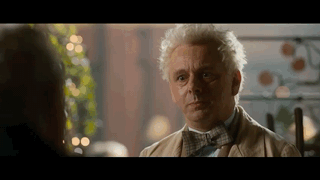
And then the Metatron separates our two entities from one another. Crowley has always given Aziraphale more courage when it comes to defiance, so Metatron invites Aziraphale away from the safety of his home(both the bookshop AND Crowley).
And then. And this is the Kicker.
The Metatron apologizes.
Not in the usual way humans do, but in the way that Crowley and Aziraphale do. By saying, I was wrong. You were right.
The Metatron praises Aziraphale. We were wrong about you.
The Metatron says that the only candidate for Supreme Archangel is him. You are heavenly.
The Metatron offers Aziraphale a way to bring Crowley with him. To bring Crowley back. We were wrong about Crowley.
Aziraphale looks at the Metatron in the face as the voice of God says Crowley’s fall was a mistake, and you can make it right. (The Metatron doesn’t actually say that in those words, but they ARE the words Aziraphale hears.)
So of course he’s excited to tell Crowley. Surely Crowley knows that his fall was a mistake too. Surely this is excellent news. The best news they’ve been given in a while. They were right after all. They can fix it. Together.
But then Crowley says no. And just as much as we think Aziraphale rejected Crowley—which of course, yes, he did—Crowley rejected Aziraphale too. And Aziraphale doesn’t understand why.
(And Holy Crap Aziraphale IS WRONG. Okay he’s wrong and it’s crazy, but I can follow the line right from before the beginning. Neil Gaiman and company, you are absolutely fantastic writers, I love how wrong they both are, and I love how wonderful they’re both trying to be, this was an incredible season.)
#good omens#good omens 2#good omens spoilers#gomens#go2 spoilers#good omens 2 spoilers#Aziraphale#crowley#crowley and aziraphale#ineffable husbands#ineffable divorce#aziracrow
929 notes
·
View notes